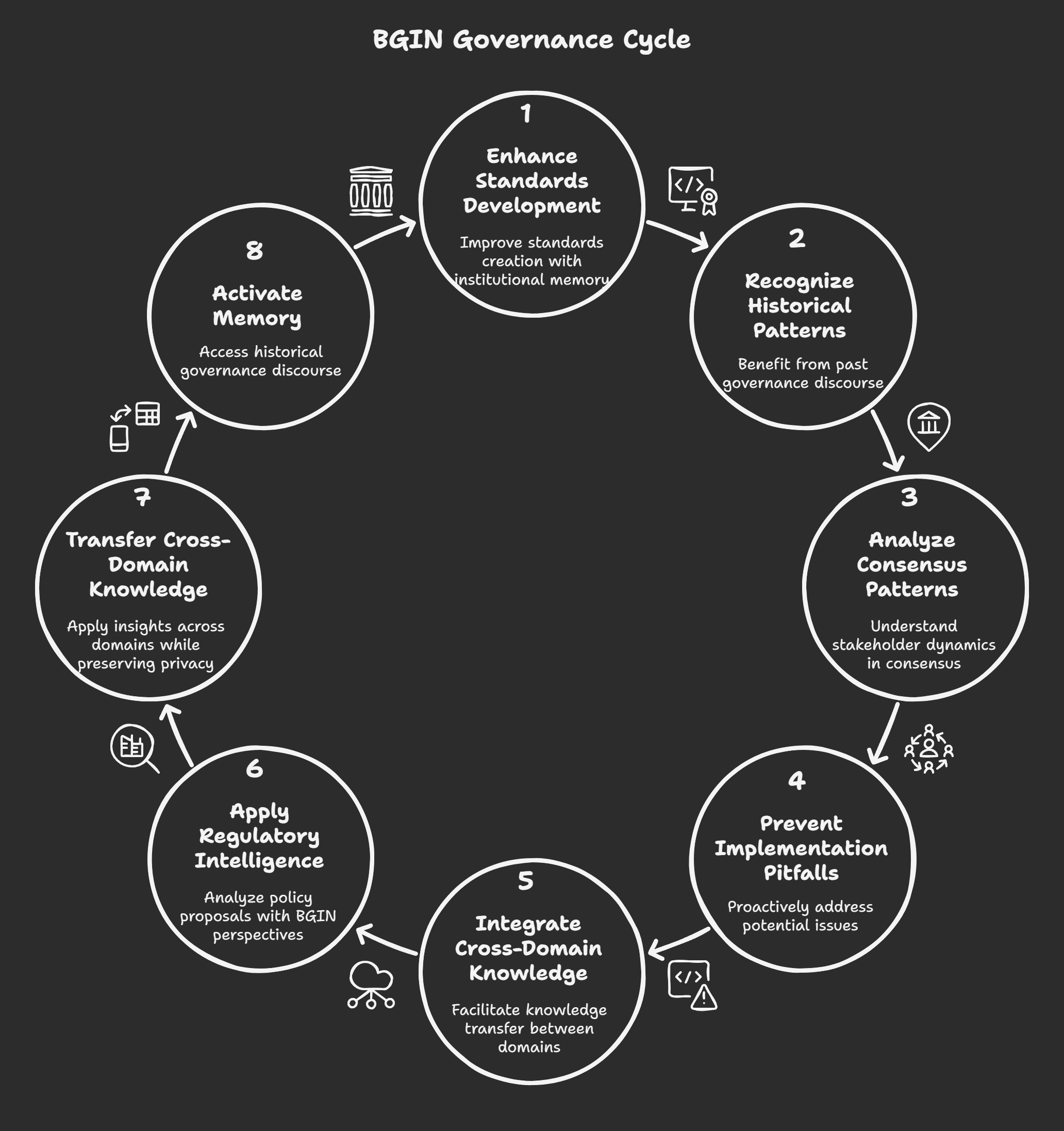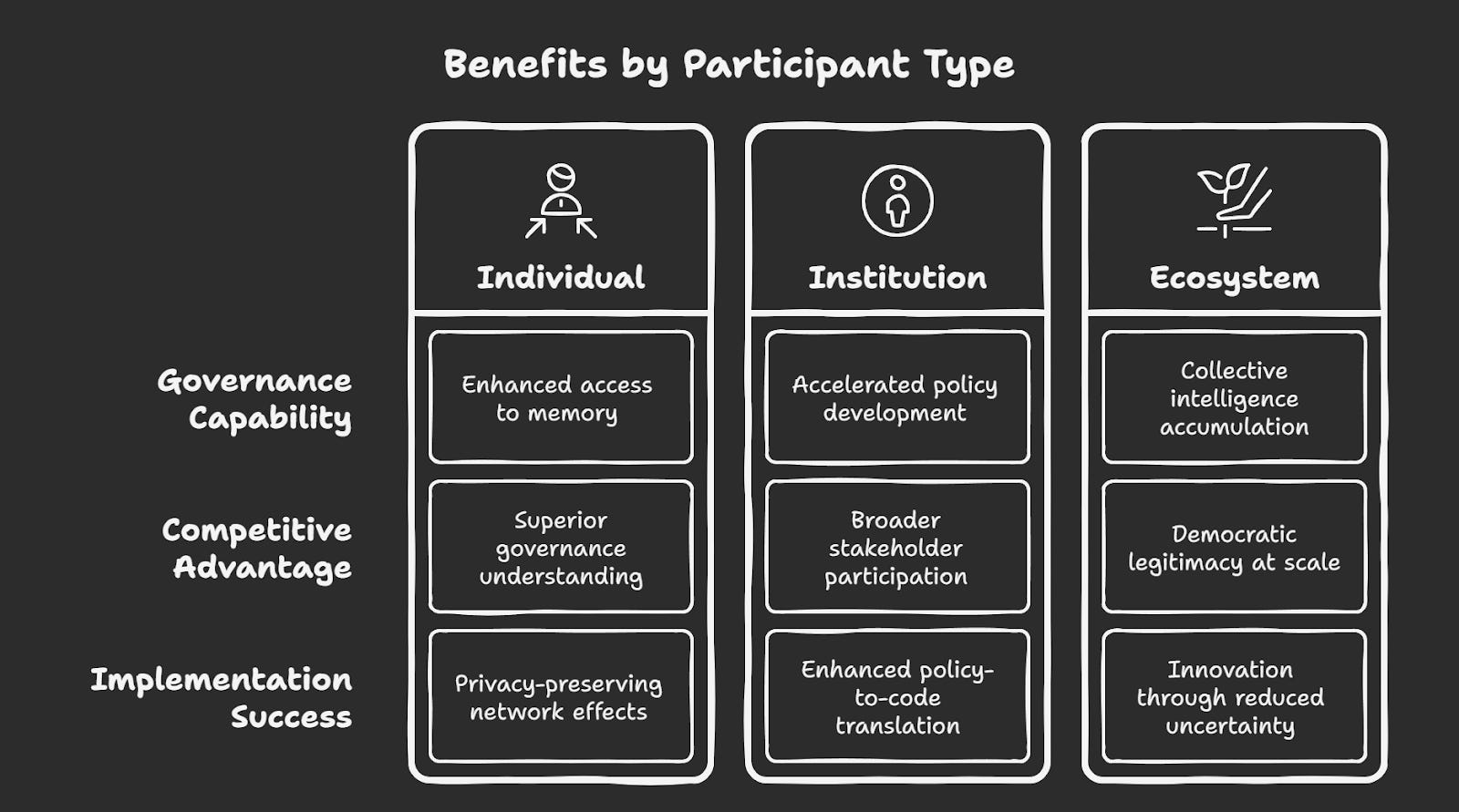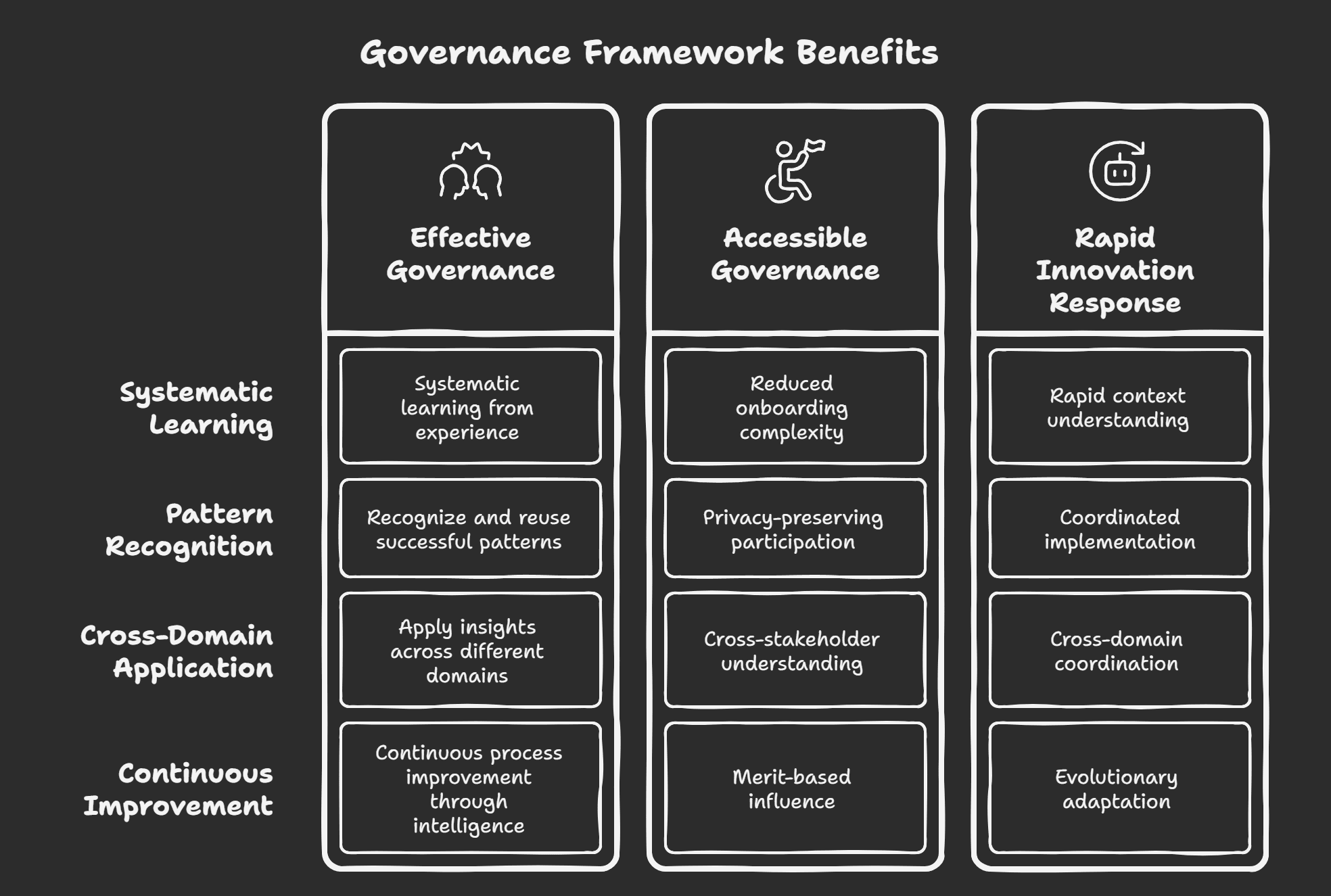Archive Intelligence That Scales Codex Wisdom
Part 4 of BGIN Agentic Framework: Archive, Codex and Discourse
This document establishes the foundational philosophy, values, and priorities for all AI agents developed within the BGIN ecosystem
Part 1: Beyond Static Governance: Living Intelligence and Digital Constellations
Part 2: The BGIN'ing of Governance Constellations
Part 3: Cryptographic Sovereignty: The Agentic Chatham House Framework
The theoretical framework of cryptographic governance intelligence reaches its full potential through practical implementation that creates tangible value for all participants while preserving the democratic legitimacy and stakeholder sovereignty that make blockchain governance sustainable.
This final part explores how BGIN agents operate in practice, potential economic value, and how they enhance rather than replace human wisdom in governance activities.
Agent Design Principles for Practical Implementation
The transition from framework to operational reality requires specific design principles that ensure BGIN agents serve their intended governance functions while preserving the stakeholder dynamics that make those functions legitimate and sustainable.
Enhanced Standards Development
BGIN agents must provide working groups with access to institutional memory about similar challenges, successful consensus patterns, and potential implementation pitfalls while accelerating high-quality standards creation and maintaining rigorous stakeholder consideration.
Historical Pattern Recognition
Archive Agents enable current working groups to benefit from years of governance discourse, accessing institutional memory about how similar technical challenges were approached, what stakeholder perspectives proved most valuable, and what implementation strategies succeeded or failed in comparable situations.
Consensus Pattern Analysis
Working groups gain access to intelligence about successful consensus formation approaches, understanding how stakeholder dynamics evolved during previous standards development and what coordination approaches proved most effective for similar multi-stakeholder challenges.
Implementation Pitfall Prevention:
Codex Agents provide working groups with intelligence about implementation challenges that emerged during previous standards deployment, enabling proactive consideration of potential issues rather than reactive problem-solving after standards adoption.
Cross-Domain Knowledge Integration:
Discourse Agents facilitate knowledge transfer between working groups addressing related challenges, enabling insights developed in one standards development process to inform parallel efforts without compromising competitive intelligence or stakeholder positioning.
The enhanced standards development approach creates compounding value where each process contributes to the institutional intelligence feedback loop.
All while preserving the deliberative quality and stakeholder consideration that make standards sustainable, forkable at any time.
Perhaps also version and logic attested onchain?
Regulatory Intelligence
Archive Agents must become sophisticated regulatory reasoning systems, analysing new policy proposals through established BGIN perspectives, identifying potential conflicts, and suggesting alignment strategies without imposing particular regulatory viewpoints.
Policy Impact Analysis:
Archive Agents analyse new regulatory proposals through the lens of institutional memory about how similar policies affected blockchain ecosystems, providing working groups with intelligence about potential impacts without advocating for particular policy positions.
Stakeholder Perspective Integration:
Regulatory intelligence incorporates an understanding of how different stakeholder groups, technology developers, financial institutions, consumer advocates, and regulatory bodies have approached similar policy challenges, enabling more comprehensive policy analysis.
Alignment Strategy Identification:
Codex Agents identify potential pathways for aligning new regulatory requirements with existing governance frameworks and technical implementations, providing working groups with implementation options rather than prescribed solutions.
Cross-Jurisdictional Pattern Recognition:
Regulatory intelligence includes an understanding of how similar policy approaches performed across different regulatory jurisdictions, enabling working groups to learn from diverse regulatory experiences without compromising stakeholder positioning in any particular jurisdiction.
Cross-Domain Knowledge Transfer
Agents must enable insights developed in one domain to become intelligently applicable to adjacent areas while maintaining stakeholder perspectives and enabling rapid knowledge propagation without compromising competitive positioning.
Pattern Abstraction:
Archive Agents identify governance patterns that prove effective across different technical domains, consensus formation approaches, stakeholder coordination mechanisms, and implementation strategies, while preserving the contextual understanding that makes those patterns applicable.
Domain Translation:
Codex Agents translate governance insights developed in one technical domain into applicable intelligence for adjacent domains, maintaining the stakeholder reasoning and competitive intelligence protection that makes translation valuable rather than merely generic.
Stakeholder Perspective Preservation:
Cross-domain knowledge transfer maintains understanding of stakeholder dynamics and competitive considerations that informed original insights, ensuring that transferred knowledge remains relevant to stakeholder contexts rather than becoming decontextualised information.
Privacy-Preserving Application:
Discourse Agents enable stakeholders to apply cross-domain insights without exposing the competitive intelligence or strategic positioning that makes those insights valuable in their specific contexts.
Cross-domain knowledge transfer creates exponential learning effects where governance insights developed in any domain can inform decision-making across the broader blockchain ecosystem.
Respecting competitive confidentiality makes authentic insight sharing possible.
Memory Activation
Benefit from historical reasoning patterns, successful consensus strategies, and avoid the pitfalls of predecessors.
Contextual Memory Retrieval:
Archive Agents enable working groups to access relevant historical governance discourse based on current challenges, providing contextual intelligence about how similar issues were approached rather than generic information retrieval.
Reasoning Pattern Application:
Memory activation includes understanding of the stakeholder reasoning and consensus formation processes that made historical governance decisions successful, enabling current working groups to apply similar approaches to new contexts.
Pitfall Pattern Recognition:
Historical memory includes intelligence about governance approaches that proved problematic or created unintended consequences, enabling current working groups to avoid repeating historical mistakes while understanding why alternative approaches succeeded.
Success Strategy Adaptation:
Memory activation enables working groups to adapt successful historical governance strategies to current contexts while preserving the stakeholder dynamics and competitive considerations that made those strategies effective.
Memory activation transforms historical governance discourse from passive documentation into active intelligence that serves current governance needs while preserving the institutional wisdom that makes governance effective.
Economic Model: Sovereignty-Preserving Value Creation
The BGIN agentic framework creates economic value through coordination amplification rather than data extraction, ensuring that value creation enhances stakeholder sovereignty rather than compromising it for platform benefit.
For Individual Participants
Enhanced Governance Capability:
Individual participants gain access to institutional memory and cross-domain intelligence that enhances their governance effectiveness without exposing their competitive positioning or strategic approaches.
Competitive Advantage Through Superior Governance Understanding:
Participants develop a deeper understanding of governance patterns and stakeholder dynamics, creating competitive advantages through more effective governance participation rather than exclusive information access.
Privacy-Preserving Network Effects:
Participants benefit from network effects created by broader governance community participation while maintaining cryptographic control over their competitive information and strategic positioning.
Merit-Based Reputation Building:
Participants can build verifiable reputation through voluntary contribution disclosure while preserving privacy for competitively sensitive work, creating portable governance credentials that reflect actual capability rather than organisational affiliation.
Individual value creation occurs through capability enhancement rather than information arbitrage, ensuring that participants become more effective governance contributors while preserving the competitive confidentiality that makes authentic participation possible.
For Institutions
Accelerated Policy Development:
Institutions gain access to Archive intelligence and Codex automation that accelerates policy development while preserving human authority over all substantive governance decisions.
Broader Stakeholder Participation:
Discourse facilitation enables institutions to engage with broader stakeholder communities without compromising competitive intelligence or strategic positioning, creating more legitimate governance outcomes through broader participation.
Enhanced Implementation Success:
Policy-to-code translation capabilities improve implementation success rates while preserving democratic legitimacy and stakeholder sovereignty over governance decisions.
Cross-Domain Coordination:
Institutions can coordinate governance approaches across different technical and regulatory domains while maintaining competitive intelligence protection and strategic autonomy.
Institutional value creation occurs through coordination amplification rather than competitive advantage extraction,
Ensure that institutions perform effective governance while preserving the stakeholder dynamics that make governance outcomes sustainable.
For Ecosystems
Collective Intelligence Accumulation:
The governance community accumulates institutional intelligence as a public good while preserving individual competitive advantages, creating compound value that benefits all participants without compromising individual sovereignty.
Democratic Legitimacy at Scale:
Broader stakeholder participation becomes possible through privacy-preserving mechanisms, creating governance outcomes with greater democratic legitimacy while preserving the deliberative quality that makes governance effective.
Innovation Through Reduced Regulatory Uncertainty:
Enhanced regulatory intelligence and implementation coordination reduce regulatory uncertainty while preserving stakeholder sovereignty over compliance approaches, creating conditions for sustained innovation.
Sustainable Coordination Mechanisms:
The framework creates coordination mechanisms that remain effective as blockchain ecosystems grow and diversify, preserving the stakeholder dynamics that make coordination legitimate while enabling coordination at unprecedented scale.
Ecosystem value creation occurs through collective capability enhancement rather than platform capture, ensuring that the broader blockchain community benefits from improved governance coordination while maintaining the competitive dynamics that drive innovation.
Enhancement Over Replacement
The BGIN agentic framework embodies the principle that artificial intelligence enhances rather than replaces human governance wisdom, creating systems that amplify stakeholder capabilities while preserving the human judgment that makes governance outcomes trustworthy and sustainable.
Governance Excellence
Institutional Memory Access:
Enable better implementation of standards and processes through access to institutional memory about successful governance patterns, while preserving human judgment for all substantive governance decisions.
Automated Routine Tasks:
Automate routine compliance checking and coordination tasks while ensuring that all decisions requiring stakeholder judgment remain under human control with appropriate oversight mechanisms.
Enhanced Deliberation Quality:
Provide working groups with relevant historical intelligence and cross-domain insights that improve deliberation quality while preserving the stakeholder dynamics that make deliberation legitimate.
Preserved Human Authority:
Maintain human authority over all substantive governance decisions while providing intelligent assistance that makes human decision-making more effective and better informed.
Regulatory Adaptation Speed
Institutional Memory Application:
Facilitate faster response to regulatory changes through access to institutional memory about how similar regulatory developments were navigated, while maintaining stakeholder sovereignty over strategic responses.
Coordinated Policy Execution:
Enable coordinated implementation of regulatory requirements through Codex automation while preserving human authority over policy interpretation and compliance strategy decisions.
Cross-Jurisdictional Learning:
Provide access to intelligence about regulatory approaches across different jurisdictions while preserving stakeholder sovereignty over jurisdiction-specific compliance strategies.
Stakeholder Coordination Enhancement:
Improve stakeholder coordination during regulatory adaptation while preserving the stakeholder dynamics and competitive considerations that make coordination authentic and sustainable.
Stakeholder Coordination Quality
Facilitated Participation:
Enable more effective stakeholder participation through Discourse Agent facilitation while ensuring that all voices are amplified rather than replaced by automated systems.
Privacy-Preserving Collaboration:
Enable meaningful collaboration between stakeholders with different competitive positions while preserving cryptographic control over competitive intelligence and strategic positioning.
Cross-Domain Relationship Building:
Facilitate relationship building between stakeholders across different technical and regulatory domains while preserving the competitive considerations that shape authentic stakeholder engagement.
Democratic Legitimacy Preservation:
Enhance democratic participation in governance processes while preserving the accountability mechanisms and stakeholder sovereignty that make democratic governance legitimate.
Implementation Success Rates
Policy-to-Code Translation:
Improve success rates in standards deployment through Codex translation of governance decisions into executable protocols while maintaining human authority over policy interpretation.
Historical Learning Application:
Enable learning from historical implementation experiences while preserving the contextual understanding and stakeholder considerations that make historical lessons applicable to current contexts.
Cross-Domain Implementation Coordination:
Facilitate consistent implementation across different technical domains while preserving stakeholder sovereignty over domain-specific implementation approaches.
Continuous Improvement Integration:
Enable continuous improvement in governance processes through feedback from implementation experience while maintaining democratic legitimacy and stakeholder oversight of improvement decisions.
Intelligence That Scales Wisdom
The BGIN Agentic Archive and Codex create an intelligence layer that makes governance processes more effective, accessible, and capable of addressing the accelerating pace of blockchain innovation while maintaining the careful stakeholder consideration that ensures sustainable governance outcomes.
Making Governance More Effective
The agentic framework enables governance communities to access their collective intelligence more systematically, learning from historical experience and applying successful patterns to new challenges while preserving the stakeholder reasoning and competitive considerations that make governance patterns effective.
Systematic Learning:
Governance communities can learn systematically from their collective experience rather than relying on individual institutional memory that disappears when participants change roles or organisations.
Pattern Recognition:
Successful governance patterns become recognisable and reusable across different contexts while preserving the stakeholder dynamics and competitive considerations that made those patterns successful.
Cross-Domain Application:
Governance insights developed in one domain can inform decision-making in adjacent areas while respecting the competitive intelligence and strategic positioning that makes cross-domain application valuable.
Continuous Improvement:
Governance processes improve continuously through accumulated institutional intelligence while preserving the democratic legitimacy and stakeholder sovereignty that make improvement decisions sustainable.
Making Governance More Accessible
The framework removes barriers to meaningful governance participation, enabling broader stakeholder engagement while preserving the deliberative quality and competitive confidentiality that make governance processes authentic and valuable.
Reduced Onboarding Complexity:
New stakeholders can understand governance contexts more quickly through access to institutional memory, enabling meaningful participation without extensive onboarding processes that burden existing participants.
Privacy-Preserving Participation:
Stakeholders can contribute meaningfully to governance processes without exposing competitive positioning or strategic intelligence, removing barriers to authentic participation that compromise governance quality.
Cross-Stakeholder Understanding:
Participants can understand diverse stakeholder perspectives without compromising competitive intelligence, enabling more effective coordination across different stakeholder groups.
Merit-Based Influence:
Governance influence emerges from demonstrated capability and valuable contribution rather than organisational affiliation or economic power, creating more legitimate governance outcomes through broader, authentic participation.
Addressing Accelerating Innovation Pace
The framework enables governance communities to respond more effectively to rapid blockchain innovation while maintaining the careful stakeholder consideration and democratic legitimacy that make governance outcomes sustainable.
Rapid Context Understanding:
Governance communities can understand new technical and regulatory challenges more quickly through access to institutional memory about similar previous challenges, enabling faster response without sacrificing deliberation quality.
Coordinated Implementation:
Policy decisions can be implemented more consistently and quickly through Codex automation while preserving human authority over policy interpretation and stakeholder sovereignty over implementation approaches.
Cross-Domain Coordination:
Governance communities can coordinate responses across different technical and regulatory domains while preserving competitive intelligence and stakeholder sovereignty that make coordination authentic and sustainable.
Evolutionary Adaptation:
Governance frameworks can evolve more effectively in response to changing conditions while preserving the stakeholder dynamics and democratic legitimacy that make evolutionary changes sustainable rather than disruptive.
BGIN Vision in Practice
Intelligence That Serves Collective Wisdom
For an organisation built on the principle that neutral, multi-stakeholder dialogue creates better governance outcomes, the BGIN Agentic Archive and Codex represent the natural evolution of that principle into an era where governance challenges require both human wisdom and computational intelligence.
This four-part exploration has traced the evolution from static governance documentation to living intelligence systems that preserve stakeholder sovereignty while scaling collective wisdom. The framework creates intelligence systems that understand how consensus emerges and can facilitate its formation while preserving the stakeholder dynamics that make consensus sustainable and legitimate.
Through cryptographic sovereignty mechanisms, coordinated agent architectures, and sovereignty-preserving economic models, the BGIN agentic framework demonstrates how artificial intelligence can enhance rather than replace human governance wisdom, creating unprecedented coordination capabilities while preserving the democratic legitimacy and stakeholder autonomy that make coordination sustainable.
The framework demonstrates how cryptographic mechanisms can resolve fundamental tensions in governance participation, enabling valuable contributions while protecting competitive confidentiality, and how intelligent systems can amplify human governance wisdom while preserving the stakeholder dynamics that make governance effective.
As blockchain ecosystems continue evolving at an accelerating pace, the principles and mechanisms explored in this series provide pathways for governance intelligence that serves collective wisdom while preserving individual sovereignty, creating the institutional infrastructure that enables thoughtful, inclusive governance at the scale that blockchain innovation requires.
The BGIN Agentic Framework
Archive, Codex and Discourse
Where sophisticated governance discourse becomes living intelligence that serves collective wisdom while preserving individual sovereignty,
Scaling the human judgment that creates sustainable consensus.






